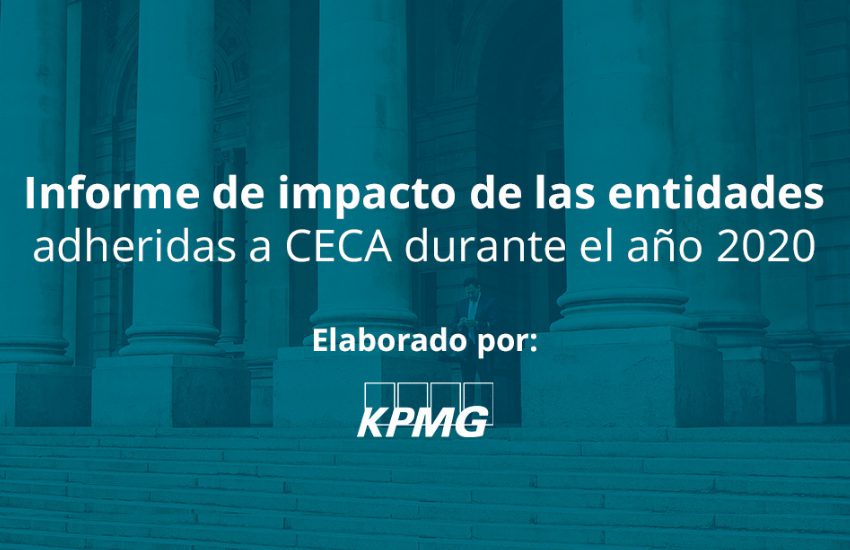The financing granted is once again the item with the greatest impact on the economy, exceeding €212.5 billion
CECA's member entities (CaixaBank, Kutxabank and Cajasur Banco, Abanca, Unicaja Banco, Ibercaja Banco, Caixa Ontinyent, Colonya Pollença and Cecabank) strengthen their commitment to socially responsible investing once again this year
The total impact of CECA member entities on the economy in 2020 was €233,905 million. The figure represents an increase of 32% compared to the amount reached in 2019. This information is set out in the 'Report on the impact of CECA's member entities during 2020', which has been prepared by KPMG for the third consecutive year. The study, which was presented today by Jerusalem Hernández, Sustainability and Good Governance partner at KPMG, stresses that this contribution is equivalent to 19% of Spain's GDP, an increase of 5 percentage points compared to the previous financial year.
The impact reflected is the result of its corporate activity, which includes the payment of salaries and purchases from suppliers; of the revitalisation derived from the financing granted by these institutions to households and businesses; as well as its social contribution through social action projects, environmental protection or innovation.
Financing as a driving force for economic activity
The revitalisation of the economy through the financing granted is once again the activity that generates the greatest impact, exceeding €212.5 billion, equivalent to 17% of Spain's GDP. The direct financing granted accounted for 56.1% of this amount, namely €119,152 million.
The indirect impact, which relates to the effect of the financing of member entities, accounts for 22.2%, totalling 47.11 billion. The amount corresponds to the activity generated at the first and second level of the supply chain of the financing recipients. Finally, the impact of induced activity, which refers to the rest of the supply chain, amounts to €46,244 million, 21.7% of the financing granted.
In total, according to the document prepared by KPMG, the impact of the financing granted is equivalent to supporting 845,838 companies. In this regard, the report notes that during the most complicated moments of the pandemic, a total of €33,108 million were mobilised in ICO facilities.
In terms of corporate activity, which includes the payment of salaries and purchases from suppliers, the impact during this period was €21,398 million, in line with the previous financial year, which represents 46.5% of the financial sector's GDP. These activities have had a real impact on the Spanish economy as a result of stimulating household consumption through net wages and salaries (€7,642 million), and boosting domestic suppliers (€7,209 million). These figures show an increase of 2.2% and 7.8% respectively compared to the 2019 financial year. The rest of the amount associated with this chapter is due to the Gross Operating Surplus, in other words, the difference between the value of production and intermediate consumption.
By sector, corporate activity has an important driving effect in the financial sector itself, which is estimated to be revitalised by more than €2.3 billion. Secondly, industry registers an impact of €2,143 million euros, equivalent to 17.2% of the gross value added of the motor vehicle manufacturing industry. This was followed by real estate and construction, which came in third place with an estimated impact of €1,978.5 million. Thus, these sectors account for 43% of the impact generated by the entities' corporate activity.
Customer focus and sustainable financing
In 2020, almost €82.1 billion were allocated to the financing of consumption by households, SMEs and the self-employed. The figure represents an increase of more than 6.3 billion compared to the 2019 financial year. On the one hand, €55,207 million have been allocated to SMEs and the self-employed, which represents 41.5% of the total national financing of these entities. On the other hand, household consumer finance totalled €26,876 million, while mortgage loans and credit for home improvements totalled approximately €17,730 million.
The document unveiled today also shows that the CECA sector is following the market trend in terms of responsible investments, as the member entities have mobilised 69% of the green, social and sustainable bond issuance in Spain. Thus, in 2020, the issuance volume of this type of product mobilised by member entities totalled €10.4 billion, including issuance and underwriting activities. These bonds have been primarily used to finance renewable energy and energy efficiency projects, and to combat the social impacts of COVID-19. The amount mobilised for renewable energies alone exceeded €6,093 million through Project Finance programmes in 108 operations.
On the other hand, socially responsible investment has also increased. As a result, the total volume of assets in Sustainable and Responsible Investment (SRI) in 2020 that CECA sector entities managed with ESG criteria amounted to €180,595 million. This is 12.5% more than in 2019 and 79% of SRI investment in domestic assets.
Post-pandemic economic context and its importance for the financial sector
Santiago Carbó, director of the Financial and Digitalisation Division at Funcas, explained that the economic context continues to be defiant and poses challenges for the government, central banks and financial and non-financial companies.
In his words, 'Widespread bottlenecks, particularly pressing in advanced economies, and rising energy prices are undermining the global recovery while intensifying inflationary pressures'. He added that 'there is a misalignment of monetary policies and that interest rate increases are not expected in the Eurozone (they are expected in the United States and have already occurred in the United Kingdom) before 2023, which means that European banks will have to continue to deal with very tight interest margins'.









